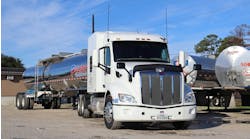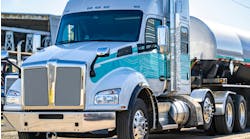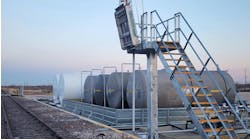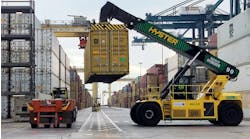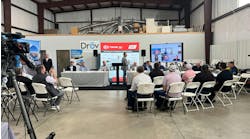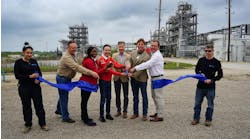The best-laid plans don’t always come together.
The Norfolk Southern and Union Pacific railroads tried to enter trucking in the 1980s, with the acquisitions of North American Van Lines and Overnite Transportation, respectively, but both eventually sold their truck-and-trailer businesses at a loss, and retreated to more familiar, tracks-and-train cars territory.
CSX Transportation insists its venture, launched in July with the purchase of tank truck titan Quality Carriers, will be different.
“We’re a different management team, in terms of how we’re going to manage Quality, and make sure we allow them to remain a trucking company and go after business that’s out there, while also focusing on how they can help us deliver more value to the customer,” said Kevin Boone, executive vice president of sales and marketing at CSX.
“And this is all about delivering value to the customer.”
Previous attempts failed, he said, because leaders didn’t understand intermodal or multi-modal transportation, or chemical logistics, like CSX and Quality, which both already excel in transloading and bulk chemical movements.
Company executives also say the mega-deal that unites CSX’s rail business, which generated $10.5 billion in revenue last year, with one of North America’s largest over-the-road haulers of liquid products syncs with industry trends, including the lack of truck drivers hampering capacity, and the push for sustainability.
And if their transformative vision is realized, the combination will benefit customers, and both companies, alike.
Shippers will save time and money using a comprehensive, one-stop solution; CSX will put more freight onto its rail, and strengthen one of its most lucrative business segments; and Quality will expand operations with new locations and equipment after escaping private-equity ownership with a more strategic partner.
“It’s exciting to be a part of a plan to change the world of bulk trucking, by combining it with rail,” said Randy Strutz, Quality Carriers president.
“That wouldn’t have been possible on our own. It never would have happened.”
Disruptive development
For a new era to start, Quality Distribution’s time had to end.
The former parent company of Quality Carriers and Boasso Global was formed in 1998 after Apollo Management purchased Chemical Leaman Tank Lines and MTL, Inc., and brought them together in a “mega merger” that formed what was then a $620 million tank truck operation. The Quality name came from MTL, which at the time had three subsidiaries: Montgomery Tank Lines, Levy Transport, and Quality Carriers.
Apollo went public with Quality Distribution in 2003, and the Tampa, Fla.-based company traded on NASDAQ until private equity firm Apax Partners bought it for approximately $800 million in 2015 and took it private.
CSX acquired Quality Carriers from Apax for $546 million, including tax assets utilized.
The transaction included Boasso remaining under Apax management as a standalone company, and ended the run of Quality Distribution at 23 years. As a result, Gary Enzor retired as chairman and CEO of Quality Distribution after 17 years with the company, including 14 as CEO—but not before giving the new union his blessing.
“It’s incredibly exciting to see the creation of the CSX/Quality Carriers combination, which has the potential to be a game-changer for our industry,” said Enzor, who remains on the Boasso board of directors. “This transaction gives CSX and Quality Carriers the unique opportunity to offer a powerful combination of truck and rail solutions to customers, with the added benefit of maintaining QC’s headquarters in Tampa.”
Strutz, the only Quality executive to make the move to CSX, agrees with Enzor’s assessment.
“I think of it as a disruptor,” he said. “It’s going to give our customers more choices, especially given what’s happening in the world right now, over the last year. Capacity is scarce and fuel costs are going up, so to give customers new options to add to their tool chest is exciting. Instead of saying I can move a railcar or I can move a tank truck, now I can say, ‘In addition, you can move intermodal, or you can use our multi-modal solution, which combines railcars, trucks, and transloads in a seamless, easy to use product.’”
Strategic investment
CSX initiated the transaction based on research led by Boone, who previously spent 18 years in the investment industry, specializing in mergers and acquisitions. He said their data analytics group wanted to understand how freight flows through the U.S., and much of their work focused on trucking, and why some commodities they move, including chemicals, also move by truck. CSX last year moved 664,000 carloads of chemical freight, compared to 637,000 carloads of coal—producing $2.3 billion in revenue.
“It is a very good market for us,” Boone said. “It has good margins, good customers, and a stable business. And we saw that there’s all this other freight out there—over a billion dollars in liquid chemical freight—moving through the Eastern United States on trucks, so we started asking ourselves, ‘Why is that happening?’
“And we realized, in most cases, it was because we, as a railroad, don’t physically touch those customers.”
Their solution, then, was to buy a trucking company, which could help them secure more chemical freight for the rail, while also reducing “adverse” truck freight. And CSX targeted Quality because it’s a leader in chemical transportation—with more than $800 million in revenue in 2020—their footprints are complementary, and, after six years of PE ownership, it was available.
Strutz says they knew a sale was coming. The only question was to who— an institutional investor, through an initial public offering (IPO), another PE, or a “strategic” partner in another transportation-related business. “For me, the best possible path was to be purchased by a strategic, in this case, CSX,” Strutz said. “It gives us a little more certainty in our future. And the best part is CSX had a specific reason for buying us.”
Boundless benefits
That reason, which is to help grow CSX’s revenue, means CSX has a vested interest in the continued success of Quality Carriers. Strategic ownership also offers other advantages, including access to “more efficient” capital, Strutz said. “In the private-equity world, you’re typically borrowing at high interest rates, and CSX is a blue-chip company that generates a lot of cash, so the access to capital at a reasonable price is greater,” he said.
Boone echoed that assessment.
“When you’re owned by a private-equity firm, capital isn’t abundant, and when you’re a highly leveraged company, your ability to reinvest in the business, particularly for growth, is challenged, and that was the case under Quality’s previous leadership,” he said. “They were significantly leveraged. Now, with the balance sheet of CSX, and our ability to generate a lot of free cash flow, if there are good reinvestments we can make in the business, we’re certainly looking at that.”
Investments in the works include new locations and equipment. CSX, based in Jacksonville, Fla., has accumulated a lot of real estate in nearly 200 years of operation, Strutz said. Now Quality can leverage idle properties for expansion. They’re already opening a new facility in Jacksonville, and developing a terminal in Richmond, Va.
The combination also helps Quality address driver-shortage issues, Boone said. American Trucking Associations said the shortage, accelerated by pandemic challenges, ballooned to 80,000 drivers this year, with most of that deficiency in long-haul drivers as younger drivers gravitate toward more regional or local driving positions, particularly in the final-mile segment. With CSX, Quality can convert more of its long-haul cargo to rail.
“It’s more important to get truckers home every night,” Boone said. “The retention rates go up significantly if you can do that, and so if you can use the truck for the short haul, and put the long hauls on the railroad, that helps Quality Carriers retain good drivers, on their side, and puts good volume on our railroad.”
With anti-trust laws, and the challenges of laying new tracks, it’s also more difficult for railroads to expand than trucking companies, Strutz said. By buying Quality, CSX can reach new last-mile customers and extend its reach beyond the points where its western-most tracks end, in Chicago, St. Louis, Memphis, and New Orleans.
“A chemical trucking company can run trucks everywhere, and bring chemicals to and from their network,” Strutz said. “That’s the idea—to put more revenue on rail by using trucks in what we’re calling intermodal or multi-modal lanes.”
Most importantly, leaders contend, their monumental marriage benefits chemical producers and shippers, who want an integrated solution that makes intermodal moves easier and more affordable, especially in light of the capacity crunch and soaring inflation, which are increasing supply-chain costs, and the growing call for more sustainable transportation as governments press for reducing carbon emissions.
“What we’re finding out, particularly in the chemical sector, is they’re very focused on ESG and the environment, so that’s something we’re leaning into heavily,” Boone said. “When you think about the savings that can be captured by converting to rail, it’s huge. And, ironically, chemical and energy customers are feeling more outside pressure from their investor bases, around ESG, and this is a really easy, quick win that—by the way—saves them money.”
Intermodal & multi-modal
Boone said CSX wants Quality to focus on “certain goals and strategies.” Promoting multi-modal and intermodal services is priority No. 1.
Multi-modal service, which they define as utilizing trucks, tank cars, and transloading to transport chemicals, already is underway. Tank cars can hold 25,000 gallons of product, or roughly four trailer loads, and CSX, through its TRANSFLO subsidiary, operates one of the largest transload networks in the country, with 45 locations.
“No one has really offered this in the industry,” said Strutz, who added that they’re prioritizing capacity for customers who use the service. “Nobody has gone to a customer and said, ‘Do you want to do this?’ Customers do it themselves, but it’s a pain. And if you ask them, they’ll say it’s a very difficult thing to manage, working with a trucking service, a rail service, and a transload service, and trying to coordinate all that.
“Most customers don’t have the bandwidth to do it.”
A new intermodal service will utilize ISO tank containers, trailer chassis, and well cars to move containerized chemicals. But this service still is in development as they await a “new generation” of intermodal equipment.
In both cases, Boone said, combining with Quality will allow CSX to offer faster, “more truck-like” service, with the reliability rail shippers appreciate. “We’re never going to be as fast as a truck, in most cases, but that’s not what the customer, particularly on the liquid chemical side, prioritizes,” he said. “They prioritize quality and reliability, and that’s what we can deliver with a multi-modal product on the intermodal side.”
Next-gen equipment
To enable new levels of multi-modal service, Quality plans to introduce a redesigned 20-foot tank container, and a new trailer chassis, Strutz says will address historic issues that have hindered domestic adoption, including unloading challenges for consignees, environmental and safety concerns, and equipment standards.
Quality already worked with CSX to develop a patent-pending prototype, and secure a contract with a tank container manufacturer. They expect to begin testing the new containers in late December or early January. “To the naked eye, they might look like any other 20-foot ISO tanks … but we made a lot of design modifications to address domestic customer-adoption issues that have come up with people who already tried it,” Strutz said.
Their vision is to add “several thousand” tank containers in the next two to three years—with a corresponding number of trailer chassis to haul them. That means their trailer fleet, already 7,000 units strong, could grow to 10,000 by 2024.
“Our goal is to place the production order by Feb. 1 (2022), and then begin to take deliveries of more significant quantities, probably in the August/September timeframe, to be able to then sell to our customers,” Strutz said.
Autonomous trucking
Quality largely will remain a separate entity, Boone said, as CSX president and CEO James Foote has made it clear that he doesn’t intend to interfere with their day-to-day operations, instead preferring to focus on providing technology and capital support, and leveraging supplier relationships that create synergies.
“We don’t want to get in the way of their ability to react to the market quickly, and develop new products,” Boone said.
That’s music to Strutz’s ears.
Now, with the acquisition complete, and an opportunity-filled future secured, he can relish in the excitement of a landscape-altering plan coming together.
“I’ve been in transportation for 20 years, and at Quality for 11, and this is the most excited I’ve ever been, because when you have a chance to help build something new and innovative, that can meet the needs of the market, it’s highly motivating,” Strutz said. “Our customers are excited about it, and our team is enthusiastic.
“We have a real sense that this is something that could be very big.”
